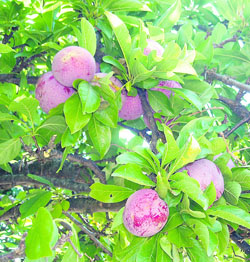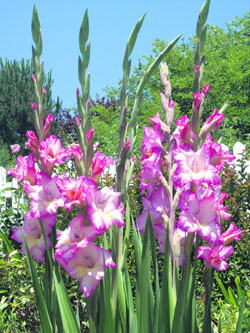
| ||||||
After every Digging Deep column is published, a few avid readers take the time to drop me a note, leave a message, or send an email. I always respond as quickly as possible as I am grateful for the comments and also welcome the questions. For this special summer edition of Digging Deep, my esteemed editor has requested that we share a selection of the questions and answers. My virtual door is always open, so feel free to submit a query or share your smart solutions.
Question: In an effort to eat fresh and be green, I want to grow a vegetable garden, but I don't know what to plant since I've never done it before. Can you give me some pointers, please?
Answer: What do you like to eat? Always plant what you love and you can't go wrong. Since it's summer now, this is the time to consider what you'll want to eat in the late fall and early winter. Although every area has its own mini micro-climate, generally speaking, Lamorinda boasts Mediterranean weather offering us a great selection of vegetables, herbs, and legumes. Here are a few of my favorite treats that you may begin sowing within the next few weeks. Seeds will sprout quickly for most varieties of lettuces, Asian greens, spinach, arugula, Swiss chard, kale, cress, sorrel, and chicory. In addition, as long as we don't get an early frost that dips below 30 degrees, add beets, radishes, and Chinese cabbage to your garden.
In addition, I plant potatoes all year long and am always checking out our local nurseries to see what's in stock. If it's in the store, it usually means that it is the right time to plant it. What you'll find ripe and ready right now in gardens are plums, prunes, apricots, peaches, blackberries, and loquats in addition to all the nutritious and delicious summer vegetables such as heirloom tomatoes, peppers, beans, and cucumbers. Happy, healthy fresh eating to you!
Question: I want to bring more beneficial insects to my garden, but what and how?
Answer: Bees, ladybugs, hummingbirds, finches, and green lacewings may be the hardest working gardeners in our yards. They'll be our unpaid helpers as long as we provide a friendly environment for them. Unfortunately during the years 2006-2008, one-third of all honeybees in the United States (and much of Europe and Canada) vanished. Thriving hives were suddenly empty as if the bees flew away and never returned. The condition earned the name Colony Collapse Disorder. There are over 4000 species of bees and with increased healthy habitat, we can help these pollinators thrive. The bumblebee and the honeybee enjoy lavender, sunflowers, red apple plant, cosmos, and mint.
Ladybugs feast on aphids so encourage them to your garden by planting fennel, cosmos, and roses. Besides feeding on nectar, hummingbirds can devour whiteflies midflight. They are attracted to brightly colored flowers, especially the color red, and most tubular plants that contain the delicious nectar they crave. Fuchsia, columbine, salvias, penstemons, larkspur, trumpet vines, and lavender are just a few of the flowering plants that will attract these colorful collaborators. To keep finches greedily feasting on aphids and other honeydew-secreting insects, make sure to provide vines for nesting. I also attract hundreds of finches to my backyard by feeding them nyjer seed. The oft overlooked garden benefactor is the green lacewing whose larvae dine on mealy bugs, scale, and aphids. Attract the adults by planting alyssum and coreopsis. With these gentle warriors on the front line, your garden will prosper as long as you avoid pesticides and herbicides, the killing fields of our pollinators and protectors.
Question: You've written about the fruit on your mulberry trees. I've only heard of fruitless mulberries. Can you tell us more?
Answer: Do you remember the riddle "All around the mulberry bush, the monkey chased the weasel. The monkey thought it was all in fun. Pop goes the weasel." Growing up my grandmother had a monkey and on our farm we had plenty of wicked weasels. We also had a wonderful mulberry bush that bore delicious fruit. My brothers and sisters and I played in that tree almost every day, never failing to sing that ditty. My mom gave me a volunteer seedling from my childhood tree and today it's a beautiful specimen bearing delectable reddish purple berries that the birds, deer, and I scramble to consume.
I grow two types of mulberry trees. Both are deciduous. The red/purple mulberry is tall and graceful and hails from the East coast and is actually called a Red Mulberry. The other bears greenish white delicately flavored fruit and is aptly named a White Mulberry. A native of eastern China, it was originally introduced into the Americas for the cultivation of silk worms..Of course it naturalized and hybridized with the native Red Mulberry. Both varieties are tolerant of poor soil and drought. There is also a Black Mulberry, which is more bush like in form.
The berries resemble a blackberry, although they are sweeter without the acidic aftertaste and most importantly, no thorns to tackle when picking. Nevertheless, it is so time consuming to pluck the fragile fruit that I prefer to just stand under the tree with all my furred and feathered friends munching. The red berry juice stains hands, clothes, and patios, so it would be better to plant a fruitless variety in a small backyard, although the fruit are really a special treat. When my children were little, we fed the leaves to the silk worms and in fact, the worms metamorphosed to our great delight one year when my son was on the TV show, Romper Room.
Question: I planted my roses but I read somewhere that roses should be planted in cages to prevent gophers from eating the roots and killing the plant. Should I dig them up and put them in a cage?
Answer: Gophers! I detest those pesky invaders who easily devastate a beautiful landscape in a matter of days. Years ago I was cast as a lead character in the now classic movie, Caddy Shack starring Chevy Chase. I turned down the role because it required nudity, although we laugh today because the only thing anyone remembers about that film are the gophers! But I digress.
If your roses are established, I wouldn't suggest digging them up as you may cause more damage than good. As far as surrounding your plants with wire cages, it depends how big your garden is and how many cages you'll need. If you are installing raised beds, make sure to line the beds with hardware cloth, a very heavy wire mesh, at least 24 inches below the soil line to keep gophers out. Gophers have attacked my lawn, wreaking havoc for over three weeks now. Just when I think I've terminated the terrors, another mound appears. If you find a sure-fire way to deter these diggers, please email me immediately! Maybe there's a remake of Caddy Shack that is looking to cast a few good gophers.
Question: I grew up on a farm just like you did, but I never learned all about gardening and farming. Maybe it's because my brothers were expected to know and do everything. Did you actually have to work the farm?
Answer: According to rural myths, farmers are supposed to only sire boys because boys help out with all the chores. My parents anticipated a male first child and had chosen a masculine name. Of course, I surprised them. After my mom gave birth to three baby girls in three years, my dad decided he no longer would listen to the other farmer's mocking regarding his growing flock of females. After enduring plenty of jokes about having daughters, my dad announced that his girls would be able to do anything a boy could do and he was going to make sure of it. He did and we did. From branding cattle, to driving tractor, plowing fields, cutting down trees, pulling barbed wire, fixing broken pipes, planting, harvesting, and delivering the grapes and walnuts, we performed all the tasks with alacrity and enjoyment. My parents finally were blessed with two magnificent sons, but not before we girls were running the ranch. A disciplined childhood combined with achievable expectations provided me with a strong work ethic and a deep respect for the land and the world we live in. Thank goodness mom and dad didn't have boys first.
My best recommendation for all parents is to get their children into the garden as young as possible and let them explore, make mistakes, be curious, ask questions, dig holes, chase lizards, and get dirty. Life is experienced through nature. We learn responsibility, patience, durability, flexibility, fearlessness, the cycles of living and dying, and especially the satisfaction of achievement. I am proud to be a farmer's daughter.
*Nature teaches beasts to know their friends. William Shakespeare
Thank you so much for your comments. Sending you a spectacular summer filled with the yummy fresh fruits, vegetables, and herbs grown in the sunshine of your garden.
Happy Gardening to You!
Cynthia Brian
The Goddess Gardener
Cynthia@goddessgardener.com
www.goddessgardener.com
Cynthia is available as a speaker, writer, and host of your events.
Call 925-377-STAR for fee
schedule and to book Cynthia.


Cynthia Brian
The Goddess Gardener
Cynthia@goddessgardener.com
www.goddessgardener.com
Cynthia is available as a speaker, writer, and host of your events.
Call 925-377-STAR for fee
schedule and to book Cynthia.
Reach the reporter at:
Copyright
